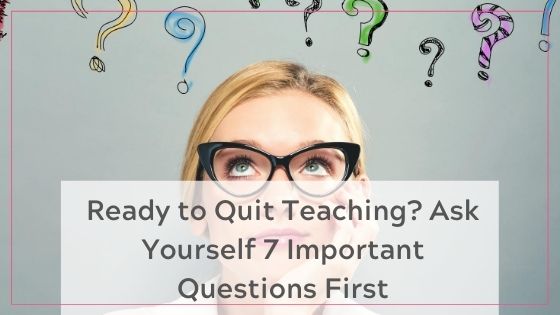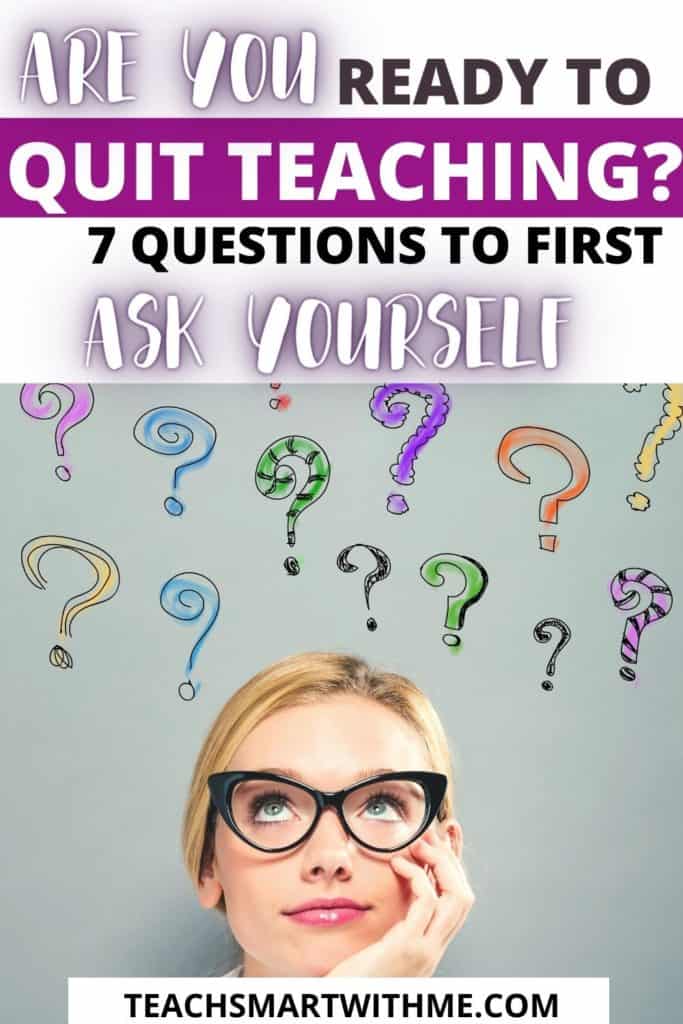You might feel done and ready to quit teaching, but before you make any rash decisions consider asking yourself these 7 important questions.

Many teachers are feeling like it’s time to leave the profession. And it’s true that educators are leaving in droves, particularly in their first 5 years. In addition to this 50% of teachers that were surveyed said they have considered quitting.
And if you’re a teacher, this is quite understandable, considering the huge demands, the workload and the expectations on you. The list of grievances and negatives in the education context could be a long as your arm.
It certainly isn’t easy being a teacher.
If this is you and you’ve just HAD ENOUGH, your head is saying – I want to quit teaching, and you are seriously considering leaving, then there is a lot to think about.
Don’t be rushed in making your decision. You might have decided to quit teaching already, but if you need help to make the final leap, think about the following 7 questions to process and weigh-up all of your options before you commit.
7 Important questions to ask yourself before you quit teaching
Go through these questions and ponder carefully your answers for each. Hopefully, you’ll be clearer and more resolute in whatever you choose to do and if you DO decide to quit, this will assist you to initiate a clear exit plan.
Q. 1: Do you want to continue doing this kind of work until you retire?
This question really depends on how many years you have until retirement. It might be at your doorstep or there might be a great many years ahead.
Think about whether you could continue in your role as a teacher until then; or even if you are able to make adjustments to ensure teaching is more sustainable for the long term.
Or are you just DONE and DUSTED – had enough! thank you very much!
Hopefully, honesty with yourself will assist with your decision to quit teaching or not.
Q. 2: Are you just exhausted or are you burned out?
I know, this is a biggy!
Take the time to consider your energy and passion for teaching. The job can be completely draining and if left unchecked, your energy will spiral into complete depletion over time. Trust me, I speak from experience. The day-in-day-out pressures and stresses can really take their toll, which will lead to burnout.
Are you just feeling negative and stressed?
It might be the first signs of burnout – One of the well-known side effects of burnout is negativity.
If this is the case, it’s an important signal for you to take some time to rest or focus on self-care. Get you Weekly Self-Care Planner HERE to help you.
But you might be beyond this. You might be so depleted and too far gone for a short stay of rest to be enough.
What is your body saying? What are the people in your life telling you? LISTEN to these signs, because sometimes trusting these indicators can be much more reliable, than what our brain tells us. (I know this to be true.)
TAKE THE TEACHER BURNOUT QUIZ HERE.
Before you quit teaching really ponder on this. Have you stepped into the trap of negativity or have you pushed your body beyond its limits and need to call it a day.
Maybe taking an extended holiday and rest will make all the difference for you or are you beyond this zone and need to have a complete break from teaching.
Only YOU know the answer to this.
Related Articles:
- Are You A Risk of Teacher Burnout? Look for Signs and Symptoms
- 7 Honest Tips How to Beat Teacher Burnout (from Someone Who Has)
Q. 3: Would you be happier and healthier if you quit teaching?
This is a straight-forward question, but it needs answering.
If you truly and honestly believe you’d be much happier by quitting teaching and/or your health is suffering as a teacher, then you do need to consider leaving the profession.
Trying to maintain a job where your happiness and health is suffering is never a good idea and is certainly not a fulfilling way to live your life.
But if the answer is NO to this… that you are just exhausted and need a break, then maybe there’s some rethinking to be done in your decision-making to quit.
Related Article: How to Improve Teacher Happiness in Difficult Times
Do you need to add more self-care to your day?
Q. 4. Could you continue to teach for another 10 – 20 years?
Are you able to work in teaching for the long haul? If your answer to this question is a resounding NO, then move to the next question.
But, if there’s an inkling of doubt and you feel like you could teach for much longer than you already have, working on intentionally developing your mindset towards teaching, might make all the difference.
To do this, start looking for the positives in your job, start to acknowledge what you’re thankful for on a daily basis (by using gratitude journaling) or even take up some work with reframing your mindset with positive affirmations. This work mind work will help build your emotional resilience and can have a dramatic effect on your mental health – Strong mental and emotional health are both needed to cope with a demanding role for the long term.
Related Articles:
- The Benefits of Fostering a Growth Mindset for Teachers
- Learn How to Improve Teacher Happiness with Gratitude Journaling
- 19 Positive Teacher Affirmations You Need to Start Now!
Q. 5: Do you have another job to go to?
Many teachers think about what they would do if they quit teaching and if you’re considering this step, it’s important to have other employment options in place to provide an income.
If you’re like most people, and your household relies on your wage as well as your partners, you must gain alternative employment before any changes can be made. It just makes sense!
Consider this carefully. Do your research about other work that’s available for someone with your extensive skills and then find a replacement that you’ll love. See HERE for some great job alternatives for teachers.
NOTE: Have you considered changing schools? This might be an alternative you haven’t thought of and could make all the difference to your circumstances.
Q. 6: What would you need to trade-off, if you changed jobs?
By changing jobs and quitting teaching, you should consider what trade-offs you’ll need to make.
When you think about it, there are many positives in teaching that often get taken for granted. Think about the holidays, the summer break, the shorter working days, the fun you can have making connections with children in your class and also the flexibility of your working hours, just to name a few.
But on the other hand, consider the long working hours, the time spent marking, lesson planning and doing report cards, as well as having to attend camps and parent interviews/conferences.
Now… think about employment outside of education… Are there things that you might not like?… particularly when compared to what you currently experience as a teacher.
Maybe work hours would be more rigid or there might be fewer holidays. On the other hand, once go home and leave this type of job you will be able to forget about work, children and parents – plus there’s NO planning or marking etc.
There’s definitely lots to think about here.
Tip: A helpful strategy when considering the trade-offs, is to do a big brain dump of all of your ideas. Plus, you can also do a PROS and CONS list. I find getting everything down on paper is so helpful to weigh up the options and have it all visible.
But honestly…only you can make the final decision.
Q. 7: Do you need to seek professional advice first?
The decision to leave teaching might be too great to undertake on your own.
For support, take on a professional life coach like me who understands the pressures, stress and burnout that often is the norm for teachers. Or you could discuss your intentions with a therapist, because bouncing these BIG ideas off other people, can be helpful and enlightening. Supportive professionals like these will be a listening ear (without the attached emotion). They can also help you to form a clear plan to achieve your goals and if that means leaving the profession, be assistive with that.
I’ve found both a life coach and therapist invaluable for me personally and I would thoroughly recommend time with someone outside of your life before committing to making these big decisions.
If you know self-care would help you in your situation, DON’T FORGET to get your FREE Weekly Self-Care Planner before you go, to help prioritise your needs:
A final word on making the decision to quit teaching
So how did you go?
I know these questions probably have given you much to think about. Use them to consider your options and lay it all out to clearly decide what your next move is.
Good luck my friend. I know this isn’t an easy time when you’re considering quitting teaching, but I do trust that you’ll make the right choices for yourself and your family.
TAKE THE TEACHER BURNOUT QUIZ TO FIND OUT IF YOU’RE IN THE DANGER ZONE.
Michelle
Related Articles
- 7 Honest Tips How to Beat Teacher Burnout (From Someone Who Has)
- Mindfulness for Teachers: 9 Easy Activities to Stay Calm in a Stressful Job
- 10 Easy Working From Home Tips to Save Your Sanity (for Busy Women)
PIN FOR LATER!



Leave a Reply